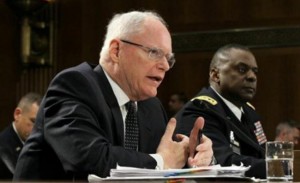Special to WorldTribune.com
BAGHDAD — Despite the troop withdrawal, the United States expects to
be heavily engaged in military projects in Iraq in 2012.
U.S. Ambassador to Baghdad James Jeffrey said Washington has been
committed to a range of military programs in Iraq that would last up to
2020. Jeffrey said the value of these programs could exceed $10 billion and
include the F-16 Block 52+ multi-role fighter, the M1A1 main battle tank,
armed helicopters and the Hellfire air-to-ground missiles.

“This is one of the biggest programs in the world,” Jeffrey said.
In a briefing on Nov. 28, the ambassador said Washington was overseeing $8 billion in Foreign Military Sales projects in Iraq. Jeffrey said this would be bolstered by several more billions of dollars when the F-16 project comes on line.
“We have about $8 billion, give or take some, of active [FMS] cases with Iraq,” Jeffrey said. “That’s not counting the new one that just came out for the F-16s. That will send it up by a number of additional billions of dollars.”
Officials said the programs in Iraq would ensure the return of a U.S. training force in 2012. They said up to 1,000 private contractors and U.S. military supervisers could be involved.
“We have a large number of trainers and people from the defense
contracts that are doing the equipping and training of the Iraqis throughout
the country,” Jeffrey said.
Jeffrey said Washington would retain a large security force in Iraq. The
force, under the direction of the U.S. embassy would reach 16,500 people and
cost more than $6 billion.
“We are standing up an embassy to carry out a $6.5 billion program,”
Jeffrey said. “When you throw in the refugee programs as well as the actual
State Department budget for 2012, of assistance in support for Iraq on a
very broad variety of security and non-security issues. The direct budget,
operating and assistance [to Iraq], was $6.2 billion.”
Jeffrey said Washington would continue to focus on counter-insurgency
training for the Iraqi military and security forces. He warned that Al Qaida
continued to operate throughout the country, with the largest presence in
the north.
“We can support Iraq to develop their conventional capabilities and to
continue the fight against terror,” Jeffrey said. “This is a very important
joint priority of ours.” Iraq was said to have agreed to a U.S. military deployment
plan for 2012.
Meanwhile, sources in the government of Prime Minister Nouri Al Maliki said Baghdad
has agreed in a principle to a U.S. plan for a military presence in the Arab
League state. They said the agreement, which still needed parliamentary
approval, would strictly define the role of U.S. military trainers in Iraq.
“The proposal is that U.S. trainers would be limited to train the Iraqis
in air defense and related areas,” an Iraqi source said. “This would mean a
certain number of Americans restricted to a portion of the military, mostly
the air force.”
The sources said Baghdad agreed to the presence of up to 3,000 U.S.
trainers and support staff in 2012. They said the U.S. personnel would focus
on protecting Iraq’s air space from intruders while preparing the air force
to eventually assume the task.
Neither the government in Baghdad nor Washington confirmed the deal,
already reported in the Iraqi media. But the sources said Al Maliki has
determined that he could recruit parliamentary support for the latest U.S.
deployment proposal.
In November, Washington submitted a proposal for the deployment of fewer
than 1,000 contractors and military personnel in Iraq. The proposal
envisioned a core of several hundred private contractors to train the Iraqi
military, with several dozen supervisors from the U.S. military.
The U.S. military has virtually completed its pullout from Iraq. As of
Dec. 7, the military is said to have no more than 8,000 troops, with the
pace of withdrawal reaching up to 4,000 per week.
American troops remain on four bases, three of them in southern Iraq. On
Dec. 7, the U.S. military withdrew from the Assad Air Force base in the
Anbar province. Officials said all U.S. military personnel have left Anbar
and that the Iraqi military was now in control of the border with Jordan
and Syria.
“The Iraqis understand they have a security gap if someone comes into
their air space who doesn’t want to be seen,” U.S. deputy military commander
in Iraq, Lt. Gen. Frank Helmick, said. “The sense I get from the Iraqis is
that they want to have a strong relationship with our country.”

You must be logged in to post a comment Login